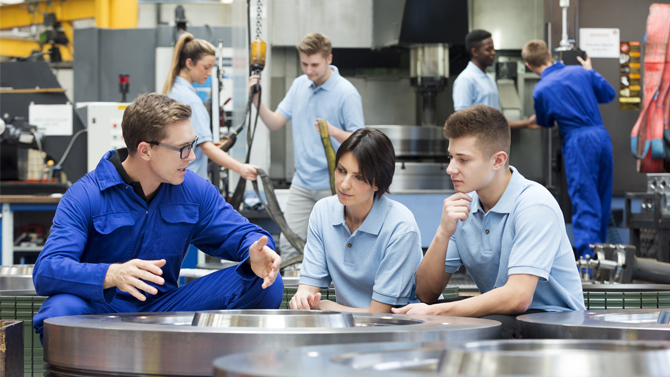Social Issues addressed by Sumitomo —Compass for the Future—
Committed to achieving carbon neutrality through carbon reduction in manufacturing processes and transition to renewable energy
 Decarbonization
Decarbonization Climate change
Climate changeMolten glass glowing brightly red in a scorching hot brick-lined furnace. Although this image typically comes to mind when people think about glassmaking, the energy-intensive glass manufacturing process is about to change. Nippon Sheet Glass (NSG Group) is doing its utmost to introduce new low-carbon fuels as replacements for the fossil fuels, such as heavy oil and natural gas, currently used for melting raw materials in glassmaking, in order to slash CO2 emissions in the glass manufacturing process. In addition to measures targeting the manufacturing process, the company is also active in introducing renewable energy and developing glass products that contribute to energy saving.
Silica sand is the principal raw material of glass. Since the melting temperature of silica sand alone is too high, soda ash is added to lower the melting temperature, and limestone is added to reduce its solubility in water. To melt these materials, the melting furnace is heated to a high temperature, approximately 1,600℃. And to prevent the glass from hardening, the melting furnace must be kept at a constant high temperature. This traditional glass manufacturing process is ripe for decarbonization by switching from conventional fossil fuels to green alternatives.

In the world’s first, in August 2021, NSG Group conducted a demonstration experiment of glass manufacturing powered by hydrogen at its plant in the UK, and succeeded in producing architectural flat glass 6 x 3 meters in size. This confirmed that hydrogen can achieve the same excellent melting performance as conventional fuels and has the potential to slash CO2 emissions from melting furnaces used in glassmaking. Nevertheless, the study also highlighted issues related to cost and the lack of infrastructure for hydrogen supply.
In quest of low-carbon fuels that could be used during the transition period prior to the full-scale introduction of zero-carbon energy sources such as hydrogen, a demonstration experiment of float glass manufacturing using 100% biofuel was conducted in February 2022. In this experiment led by Glass Futures, a UK-based research and technology organization of which NSG Group is a member, approximately 15,000 m2 of float glass was successfully manufactured. It was confirmed that biofuel emits 80% less CO2 compared to natural gas, which is currently the principal fuel used in the UK, suggesting that CO2 emissions from the glass manufacturing process could be greatly reduced even before zero-carbon options are developed and put into practical use.

In addition to reducing CO2 emissions in the manufacturing process, NSG Group is endeavoring to decarbonize the operations at its facilities by transitioning to electricity derived from renewables. In January 2022, the company became the first glass manufacturer operating in Poland to sign a 10-year Power Purchase Agreement (PPA) for renewable electricity generated by a wind farm. By purchasing approximately 100 gigawatt-hours (GWh) per year for its Polish sites at a fixed price under the PPA, NSG Group expects to achieve a reduction in CO2 emissions equivalent to the amount emitted by approximately 15,000 passenger cars in one year of operation (or 278 million km traveled).
In yet another noteworthy initiative, in May 2022, NSG Group installed more than 4,300 thin-film solar panels, manufactured by First Solar with a generating capacity of 1.4 megawatts (MW), at the Rossford plant in Ohio, the U.S. Once they are in full operation, they will be supplying approximately 2.5 million kWh of renewable electricity annually.

NSG Group’s socially beneficial decarbonizing efforts also extend to product development. In May 2019, the company began joint development of transparent solar windows with Ubiquitous Energy, a leader in transparent solar panel technology. The aim is to develop a power-generating window by adding power generation capabilities to the conventional window glass. While maintaining the functionality of ordinary transparent window glass, invisible ultraviolet and infrared rays are selectively absorbed to generate electricity. Various experiments are underway with a view to commercialization. Building-integrated photovoltaic (BIPV) power generation, a novel renewable energy source eminently suited to urban areas where space constraints make installation of conventional solar panels difficult, is a focus of high expectations.

In May 2022, NSG Group announced its commitment to achieving carbon neutrality by 2050, raising its CO2 emission reduction target by 2030 to 30% of the 2018 level. In accordance with its unswerving commitment to achieving carbon neutrality by 2050 for the benefit of society, NSG Group is accelerating its initiatives toward this goal. In addition, the company is implementing various other measures, such as CCSU (carbon capture, storage, and utilization), the use of alternative raw materials in glassmaking, and greater use of cullet (reuse of glass). NSG Group will further promote initiatives to make carbon neutrality a reality.



Read about initiatives to achieve a low-carbon society, aiming at net-zero greenhouse gas emissions since these emissions are implicated in global warming.

In view of ongoing globalization and the growing complexity of supply chains, companies need to respond appropriately to issues in supply chains.

The pace of workstyle reform is accelerating as the COVID-19 pandemic has prompted numerous companies to embrace novel ways of working.

For companies, the COVID-19 pandemic has brought the crucial importance of employee health into sharp focus.

Accelerating global warming poses serious business risks. Accordingly, companies need to formulate strategies and implement specific countermeasures from a medium- to long-term perspective.

Spurred by efforts to reduce environmental impacts and in line with increasing social needs, replacement of gasoline-powered vehicles with electric vehicles is accelerating.

Vigorous initiatives are afoot to tackle social issues by revitalizing communities and the interpersonal relationships that bind them together.

Poverty persists in contemporary Japan and the existence of child poverty is a grave concern.

In view of the continuing decline of Japan’s working age population, due to population aging coupled with a low birthrate, development of the next generation is an urgent issue.

The rapid progress in medicine in recent years is largely due to the efforts of not only universities and other research institutions but also of companies to develop cutting-edge technologies.

Numerous initiatives to promote industry and commerce at the regional and community level are underway, involving the use of renewable energy and thus contributing to decarbonization.

One-third of food produced is lost or wasted globally, amounting to about 1.3 billion tons per year. Food loss and waste is a pressing issue in need of a solution.

Companies are addressing a wide range of issues so that people and companies can coexist in harmony with the global environment.

In addition to natural disasters, there are various types of hazards whose nature, incidence and severity are changing with the times. Resilience and flexibility are indispensable in dealing with them.

Read about initiatives to achieve sustainable regional revitalization. The attributes and resources that each region can offer are leveraged to strengthen local economies and overcome the problem of population decline.